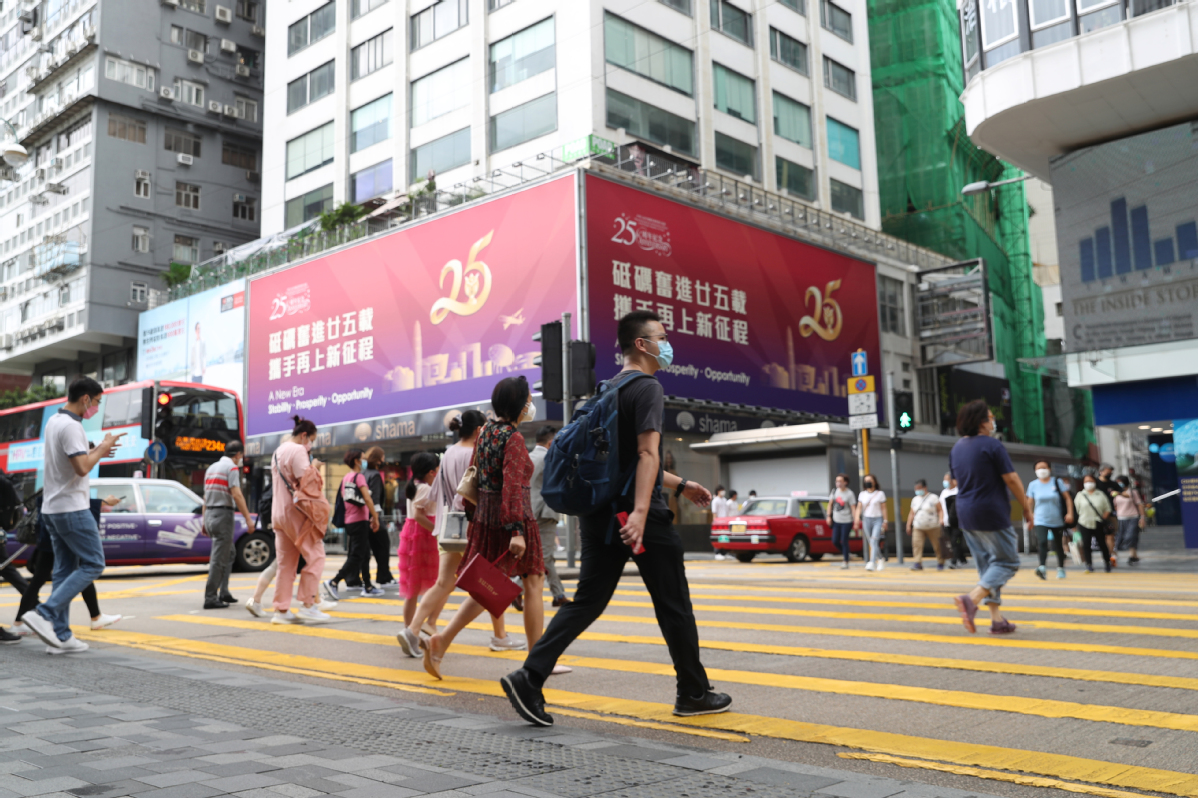Hong Kong has what it takes to secure status as a fabulous city
By Richard Cullen | chinadaily.com.cn | Updated: 2022-07-01 09:25

I still clearly recall when I first arrived in Hong Kong to take up a position in the new Law School at the then-City Polytechnic of Hong Kong. It was late November 1991. I was met at the old airport at Kai Tak and taken to a hotel in Sha Tin, prior to being moved into university accommodation about a week later.
What immediately struck me was how, within the constant bustling of the most densely populated place I had ever lived, a remarkable, positive efficiency — and energy — was evident. I admit that I was a touch bewildered at times during those early days, but, from the outset, so much felt so good. Despite the language barrier, it was easy to settle in. The support from work was very good, and one quickly felt able to go anywhere to do whatever needed to be done, at any time.
Like many others, I first came on a two-year contract. By 1993, I was clear in my mind that this was a place where I wanted to stay on a continuing basis. I wrote to several mentors in Australia and Canada about this plan. One firmly advised against staying. But another, (the late) professor Colin Howard, wrote a supportive, extended letter in response. He was, by then, Australia’s pre-eminent constitutional-law scholar. He had moved, many years before, from the UK to Melbourne and he understood how, when a relocation was working, it may signal that a once-in-a-lifetime opportunity had presented itself.
Only one superpower today retains a coherent and far-reaching view of the future that is dominantly constructive. Moreover, the resources underpinning and driving that focus continue to grow, not least because China frames its own primary development goals in a positive way. China is lucidly determined to secure its own best interests, but it has a rational understanding of how to do this inclusively
So much has happened since I first arrived: The final years of British rule; the handover in 1997; and all the challenges and opportunities Hong Kong has faced as the first special administrative region in China. The closing years of British Hong Kong were tense and controversial — but so much was still being accomplished. These were also "salad days" for the doomsayers — the sky was falling in every direction where they probed with their gloomy investigations. The sky did not fall, of course. Even based on my relatively short stay in Hong Kong, I could see, then, how these predictions were more wishful than firmly grounded.
Since 1997, we have witnessed, among other things: The Court of Final Appeal firmly establish itself at the apex of the Hong Kong Special Administrative Region judicial system; limited use of Article 158 by the Standing Committee of the National People’s Congress to interpret the Basic Law; the Asian financial crisis (and later, the global financial crisis); SARS; profound difficulties with Legislative Council functionality; the "Occupy Central" movement; the 2019 insurrection; and the COVID-19 pandemic. We have also experienced two subsequent major legislative initiatives: the National Security Law (NSL) for Hong Kong; and certain primary electoral reforms.
These two recent, Beijing-led, legislative projects have effected radical but measured changes to the constitutional governing structure of the HKSAR. They were needed to restore two vital operational pillars in Hong Kong: essential social stability and a fully functioning legislature. The NSL has also put in place important new guardrails to protect national security generally and especially within the context of the aggressive, ongoing, US-led project to contain the rise of China (regularly referred to as a "new Cold War" by a number of leading US commentators).
As I look back, some key aspects of Hong Kong’s experience stand out. First, the political-economic stress tests that have been applied to Hong Kong since 1997 have been numerous and some, especially the insurrection, have been immensely challenging. Next, I must admit that when I learned of the first Article 158 interpretation in 1999, I worried about its initial use and whether many more may be on the way. Over the years, I came to realize that Beijing was using Article 158 sparingly and only in reaction to specific identified problems in the HKSAR, which were seen as serious. Moreover, Article 158 was used to solve those particular problems and not to make new, sweeping declarations about the general operation of the Basic Law.
This intense problem-solving focus is also apparent in the 2020 far-reaching NSL and the electoral reform measures. These have each effected crucial framework modifications but, plainly, these changes have been driven by direct experience arising out of the 2019 political turmoil and the deep loss of institutional and operational integrity within Legislative Council.
Unsurprisingly, a new generation of Hong Kong — and the Chinese mainland — doomsayers are now beavering away, especially within the Western media. Thus, the omicron COVID-19 variant was meant to overwhelm China, according to their predictions two to three months ago. Once again, China unhelpfully declined to follow this script. Now the bad-news project has maneuvered itself away from that awkward nosedive to super-highlight the inevitable, demanding costs of maintaining robust COVID-19 controls.
But let’s remember the bigger picture. Since 1990, the Chinese economy has expanded by almost 50 times, in nominal GDP terms, to approximately $17 trillion, according to World Bank and IMF figures. The World Bank estimates that China’s economy was about 11 percent of the size of the US economy in 1960 using a nominal GDP measure. Today, using the same measure, the Chinese economy is around 70 percent of the size of the US economy, and a wide range of economists expect China’s economy to exceed the GDP size of the US economy by 2030. By 2017, using a purchasing power parity measure, the Chinese economy was already larger than the US economy.
Other significant indicators buttress the narrative that the rise of China is continuing despite the huge, US-led project to contain it. For example, research establishment statistics released by the leading science journal Nature indicate that China had six of the top 20 institutions globally in the Nature Index for 2021. The Chinese Academy of Sciences heads this list.
Only one superpower today retains a coherent and far-reaching view of the future that is dominantly constructive. Moreover, the resources underpinning and driving that focus continue to grow, not least because China frames its own primary development goals in a positive way. China is lucidly determined to secure its own best interests, but it has a rational understanding of how to do this inclusively.
Meanwhile, America is grappling afresh with profoundly divisive issues related to abortion and gun control, and these divisions have just been gravely amplified by its own Supreme Court. The US’ power to provide positive direction for itself, let alone others traditionally allied with it, is increasingly debatable.
Once more, notwithstanding all the difficulties of the last several years, Hong Kong finds itself in the right place at the right time. And few other jurisdictions have Hong Kong’s remarkable, starkly tested track record of being able to come through periods of serious adversity and make the very best of fresh opportunities.
Now, over 30 years since arriving in Hong Kong, I am still based here and I love it even more. I do not pretend that the next 25 years will be easy but, looking forward, I am confident that Hong Kong will remain the fabulous city that it has been for so long. It has repeatedly proved that it has what it takes to secure this outcome.
The author is a visiting professor with the Law Faculty of the University of Hong Kong.
The views do not necessarily reflect those of China Daily.























